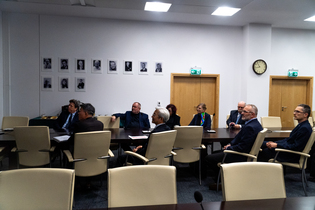Visit of the Ambassador of the Republic of Korea to the Faculty of Physics, University of Warsaw
2025-11-27
On 25 November 2025, the Faculty of Physics at the University of Warsaw hosted a delegation from the Embassy of the Republic of Korea in Poland. The Korean guests met with the University’s authorities, the deans of the Faculty, and UW researchers. The discussions focused on the further development of educational and scientific cooperation within the Nuclear Collaboration Center (NCC), a nuclear energy training centre operating at the Faculty of Physics.
The visit was attended by Mr. Jun Youl Tae, Ambassador of the Republic of Korea, and Ms. Jaehui Moon, Third Secretary of the Embassy. From the University of Warsaw, the meeting was joined by: the Rector of the University of Warsaw, Prof. Alojzy Nowak; representatives of the Faculty of Physics — Prof. Krzysztof Turzyński, Vice-Dean for Student Affairs, and Prof. Marek Karny, Vice-Dean for Finance; Prof. Agnieszka Korgul, coordinator of academic cooperation between UW and KINGS and head of the Nuclear Energy programme at UW; representatives of the Faculty of Chemistry — Prof. Sławomir Sęk, Dean, and Dr. Maciej Chotkowski, Vice-Dean for Student Affairs; Dr. Anna Paradowska from the Department of Korean Studies at the Faculty of Asian and African Studies; Dr. Paweł J. Napiorkowski, Director of the Heavy Ion Laboratory (SLCJ); and Prof. Ki Sig Kang from KEPCO International Nuclear Graduate School, currently hosted at the Faculty of Physics.
As part of the visit, the guests toured the Nuclear Collaboration Center (NCC), a nuclear energy training centre at the Faculty of Physics, developed in cooperation with the Faculty of Asian and African Studies and the Faculty of Chemistry. The Center was established in 2024 under an agreement with South Korean institutions: KEPCO International Nuclear Graduate School (KINGS), Pusan National University (PNU), and the Korea Nuclear Association for International Cooperation (KNA).
The mission of the NCC is to educate future leaders in nuclear energy through specialised educational programmes, international cooperation, and leadership development. The Center offers courses for both students and technical-sector professionals and also conducts open-access classes. One of its goals is also to support research and cooperation with the nuclear industry.
During the meeting, Prof. Krzysztof Turzyński presented the educational offer of the Faculty of Physics, outlined the activities conducted so far within NCC, and discussed cooperation with sister NCC units at Brno University of Technology (BUT) and the Czech Technical University in Prague (CTU).
“We are very pleased with our cooperation with our Korean partners. We have long admired your achievements, both economic and scientific, in many fields: economics, the sciences, and in particular electronics, computer science, and energy. Looking to the future, we remain deeply committed to strengthening cooperation between our institutions,” said Prof. Alojzy Z. Nowak, Rector of the University of Warsaw. “Building bridges between our countries is a unique value and a major asset. Our cultures differ, but our ways of thinking and working are remarkably similar.”
Ambassador Jun Youl Tae thanked the Rector and the Faculty authorities for their warm welcome. “Poland is an extremely valuable partner for us. Our cooperation in business and economic fields continues to grow, from power plants and energy storage systems to defence equipment. The Nuclear Collaboration Center is a symbol of our shared commitment,” he emphasized. “Education of the next generations is crucial for our development and prosperity. There are many opportunities for further cooperation, and the NCC is only one example.”
The University of Warsaw has been training specialists for the Polish nuclear sector since 2011. In 2020, the University signed its first cooperation agreement with KINGS, and in March 2024 concluded another one, which enabled the establishment of the NCC.






